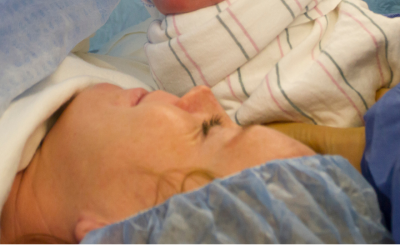
The Link Between Preeclampsia and Heart Disease
You may think of preeclampsia as high blood pressure that occurs during or immediately after pregnancy. That’s simply not the case. Preeclampsia can occur up to six weeks postpartum.
And that’s not all: Research is finding that preeclampsia appears to be a significant warning sign for heart disease after pregnancy. In fact, the American Heart Association’s guidelines on cardiovascular disease in women consider preeclampsia as strong a risk factor for heart disease as a failed stress test—a test commonly used to identify existing heart disease.
Recognizing this important risk factor is vital to women’s heart health because heart disease is the leading cause of death in women in the United States.
Medical researchers do not yet know exactly how or why preeclampsia and future heart disease are linked, but they do know:
- A history of preeclampsia doubles the risk of heart attack, stroke and blood clots within 5 to 15 years after pregnancy.
- Women who have repeat or severe preeclampsia or preeclampsia accompanied by stillbirth are at greater risk of heart disease than women who have high blood pressure only or preeclampsia during a single pregnancy.
- Many women may not be aware that preeclampsia and other pregnancy complications can signal heart disease risk. A study found that 13 percent of women screened for heart disease risk factors during an OB/GYN visit had three or more cardiovascular disease risk factors they were not aware of.
If you have ever had preeclampsia, it is vital your primary care doctor is aware of your heart disease risk factor. Your health care professional can help you determine next steps for your heart health.
In the meantime, take good care of your ticker by following these 5 steps to a heart-
healthy diet.
Beth Battaglino, RN
President & CEO, HealthyWomen
Beth Battaglino, RN, brings a unique combination of sharp business expertise and, as a practicing registered nurse, medical knowledge to her role as President and CEO of HealthyWomen, a non-profit organization providing women with in-depth, objective, medically-approved information on a broad range of women's health issues. Beth has worked in the healthcare industry for nearly 20 years, helping to define and drive public education programs on a broad range of women's health issues.
Related Articles

Your story is needed to improve outcomes for moms like you. Add your voice to critical preeclampsia research to ensure that every story is heard.

Frequently asked questions about the Preeclampsia Registry, a patient-driven registry and biobank.

The Preeclampsia Foundation offers research funding, study recruitment, and other patient engagement services to researchers.

We provide research grant funding to advance progress towards detection, prevention, or treatment of preeclampsia, HELLP syndrome, and other hypertensive disorders of pregnancy.

Recent findings in preeclampsia research have shown that preeclampsia likely has at least two variants – an early onset and a late onset variant. Early onset is typically defined as before 34 we...

Preeclampsia is a pregnancy complication marked by new-onset high blood pressure and signs of stress on organs such as the kidneys, liver, and brain. While much attention is often given to preterm dis...

Preeclampsia is a serious problem that can happen during pregnancy. It often affects the brain and can cause headaches, vision problems, strong reflexes, and seizures (called eclampsia). In this study...

Pregnancy offers a unique window into a woman’s future heart and cardiovascular health. Conditions such as hypertensive disorders of pregnancy (HDP) which include gestational hypertension, preec...

Heart disease, also called cardiovascular disease (CVD), is becoming more common in young women across the United States. Hypertensive disorders of pregnancy (HDP) is a group of conditions that includ...

